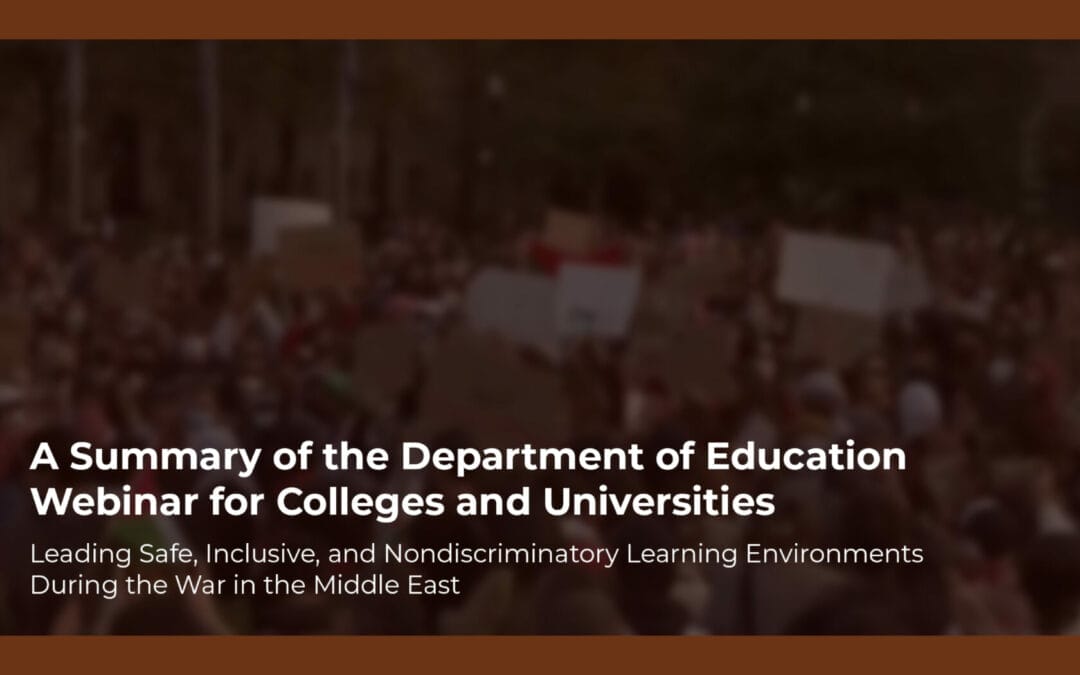On December 14, Secretary of Education Miguel Cardona hosted a national webinar intended to address what Secretary Cardona referred to as the “alarming” rise of antisemitism, anti-Sikh, anti-Muslim and anti-Arab incidents, and to remind listeners of their obligations to ensure that their learning environment is free from discrimination based on shared ancestry or ethnic characteristics. The webinar also shared resources from the Department of Education to help respond to the rise in antisemitism, Islamophobia, anti-Arab hate, and other forms of discrimination.
The Department of Education discussed the importance of protecting free speech while recognizing that some speech may contribute to a hostile environment as schools seek to balance the right of free speech with the reality of inflammatory rhetoric.
While Title VI does not offer protection from harassment or discrimination based on religion, the Department of Education addressed this, and explained why Title VI nonetheless covers students who are, or who are perceived to be, Jewish or Muslim by tying this to protections based on a student’s actual or perceived: (i) shared ancestry or ethnic characteristics; or (ii) citizenship or residency in a country with a dominant religion or distinct religious identity. In explaining these protections, Assistant Secretary Catherine E. Lhamon, referenced the Dear Colleague Letter issued by the Department of Education on Nov 7, 2023, which reminds schools of their obligation to uphold the civil rights of students who are, or who are perceived to be, Jewish, Israeli, Muslim, Arab, or Palestinian or of any other shared ancestry. She reminded schools of their responsibility to address discrimination when the discrimination involves racial, ethnic, or ancestral slurs or stereotypes, or incidents of harassment when based on a student’s skin color, physical features, or style of dress that reflects both ethnic and religious traditions, to name a few characteristics. Schools’ obligations also include addressing discrimination against students based on the region of the world they come from or are perceived to come from.
Secretary Cardona noted that student safety is the Department’s top priority, while encouraging schools to embrace the value of the diversity of our country, and allowing all the ability to celebrate who they are while engaging in debate. He also recognized that this is one of the toughest times in the history of higher education in which to lead a campus.
Leaders from several institutions also offered some practical suggestions for ways to address campus climate, educate students, and reduce bias.
Katy Joseph, the Deputy Director of the Center for Faith-Based and Neighborhood Partnerships spoke about how the war in the Middle East is impacting students’ ability to learn, including their feelings of safety, belonging and mental health. She suggested four strategies that schools might take:
1) Communicate clearly and consistently with various groups that make up the community—students, faculty, and staff.
2) Create spaces for coming together and learning together in thoughtful and consistent ways, adding that facilitators should be selected carefully for their expertise and their ability to facilitate an open and safe dialogue.
3) Provide rapid and consistent response to events, meaning that schools may need to invest in the funds to ensure the school has the ability to do so. She suggested that communities consider how the presence of law enforcement might affect certain communities, as some might be comforted by the presence of law enforcement and feel safer, while others might feel less safe.
4) Make support resources available to those who need them, which might include training for faculty and staff on working with diverse communities, training for faculty on classroom management, and ensuring that counselors have training on cultural competency so that they can work effectively with Jewish, Arab, Muslim, and all other student groups.
Sian Leah Beilock, President of Dartmouth, said that a way to show that hate has no place at your institution is to engage in dialogue in a timely manner after a crisis. She used the example of Dartmouth, immediately after Oct 7, gathering their experts in Jewish studies and Islamic studies to create panel discussions open to the whole community. She noted that those efforts did not come about automatically but were due to a history of team teaching and building trust. She said the faculty demonstrated to the community how to create “not just a safe space but a brave space in an intellectual environment that challenges us to do our best thinking.”
Darryll J Pines, President of University of Maryland, talked about how this time offered higher education a “teachable moment” where it became clear there is a need to convene crisis teams to address the mental health, the social fabric and the values of our community, to consider the effects of the conflict and the aftermath. In their case, they needed to review campus policies to uphold the right to vigils and protests, including reviewing free speech, first amendment rights, and academic freedom of faculty, staff and students. He also said they reviewed their diversity and inclusion training modules to make sure they included discussions about hate, antisemitism, Islamophobia and anti-Arab racism. Pines noted that he had created a presidential portal for every message sent to the campus, as well as a portal on free speech rights and academic freedom as a way to be inclusive and educate at the same time. He also talked about using the arts for healing, especially through music and its ability to form a common humanity.
Najeeba Syeed, Professor/Executive Director of Interfaith Institute, Augsberg University, said that bias reduction happens when students, faculty and staff are “religiously literate” either through reading, education, or interaction, noting they “learn through text and context.” At Augsburg, a private Lutheran school in Minnesota that is ethnically diverse, interfaith work is central to their community. Professor Syeed suggested that better teaching of religion can minimize the concept of “’difference’, where students and leaders work on the development of ‘humble listening’ and awareness of other experiences.'” Professor Syeed noted that Augsburg already has religious “literacy chapels,” or dedicated spaces that offer better understanding of diverse religious backgrounds, while also allowing community members to employ these tools so people are able to humanize differences and reduce bias. She noted that creation of spaces for people to talk about the impact of what they are experiencing is important, but that schools should also create spaces for those students who know little but want to learn more.
The consensus of these experts and of the Department of Education is, as summarized by President Beilock, that it is hard to hate up close. They suggested the way for students to trust in their educational institution is by seeing responsive leadership that does not remain silent about the rise of antisemitism, Islamophobia and other discrimination and harassment on their campuses, as silence in the face of such incidents only serves to create more crises. The parting thought that Secretary Cardona conveyed was that “there’s no start and end but an ongoing process to build capacity.”
Grand River Solutions provides a wide range of solutions to further an equitable culture of trust, respect and belonging. If you would like consultation on reviewing your policy and procedures in regard to the rights and responsibilities under Title VI, please reach out to our Equity and Policy experts here.

